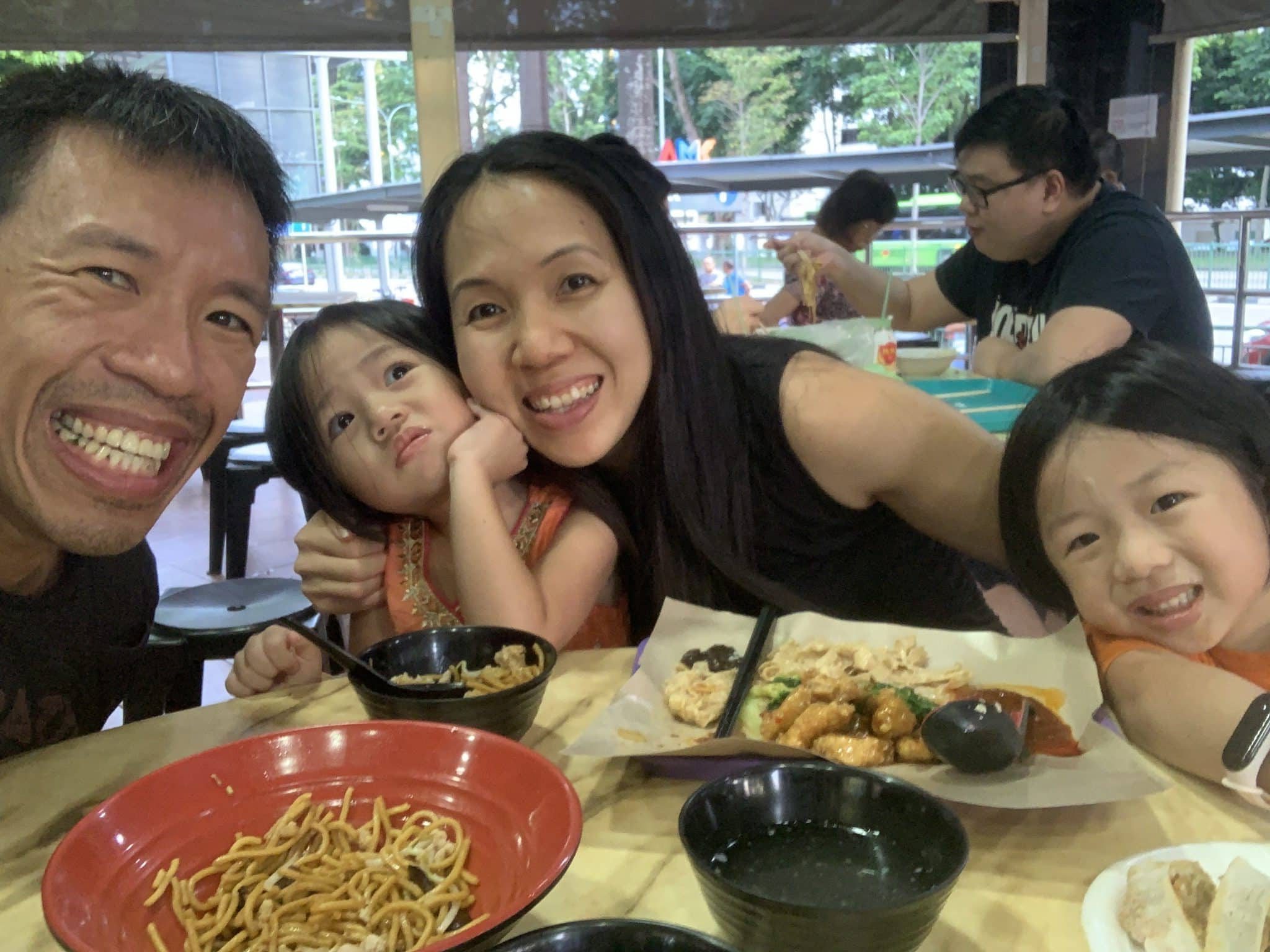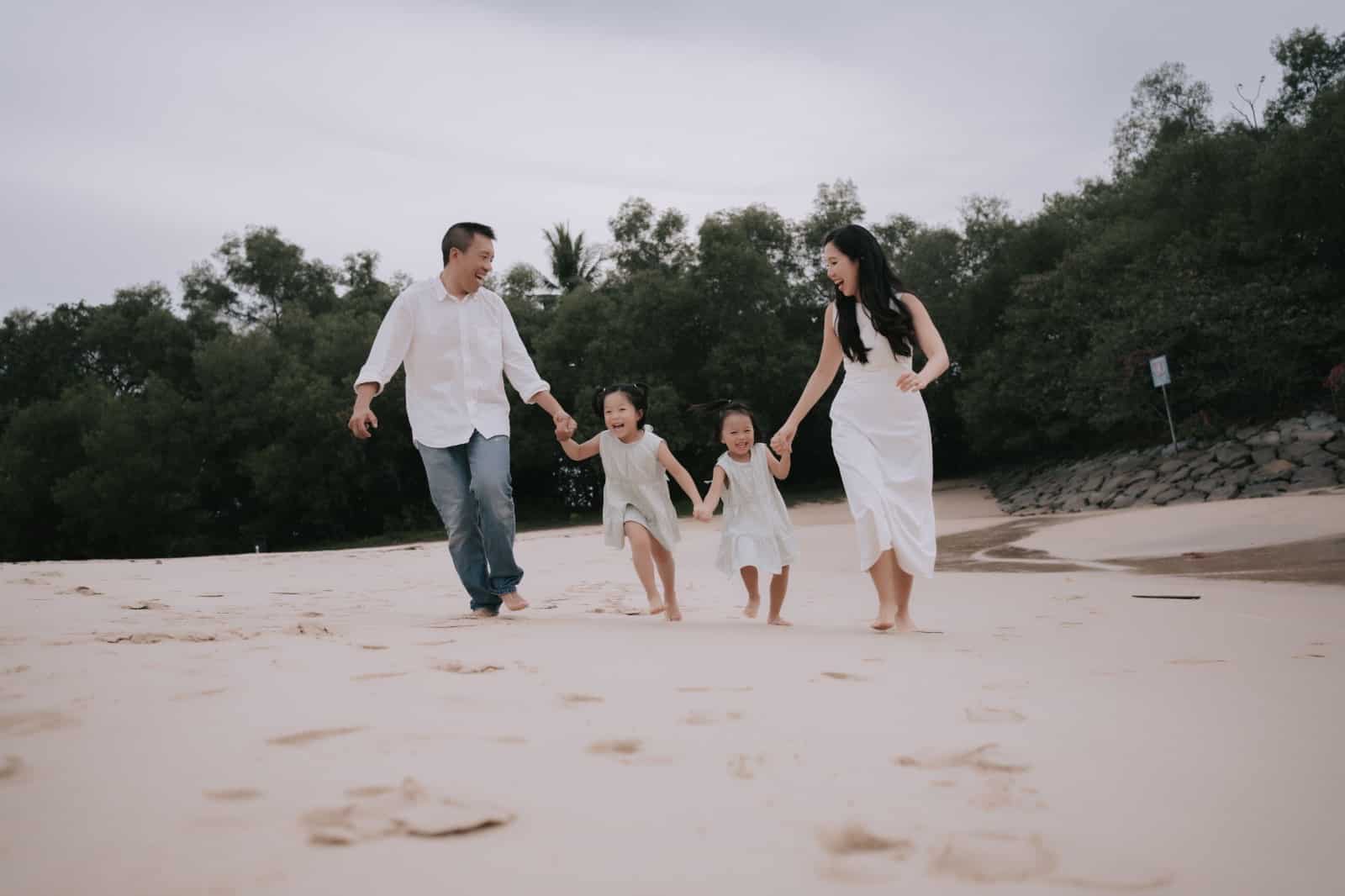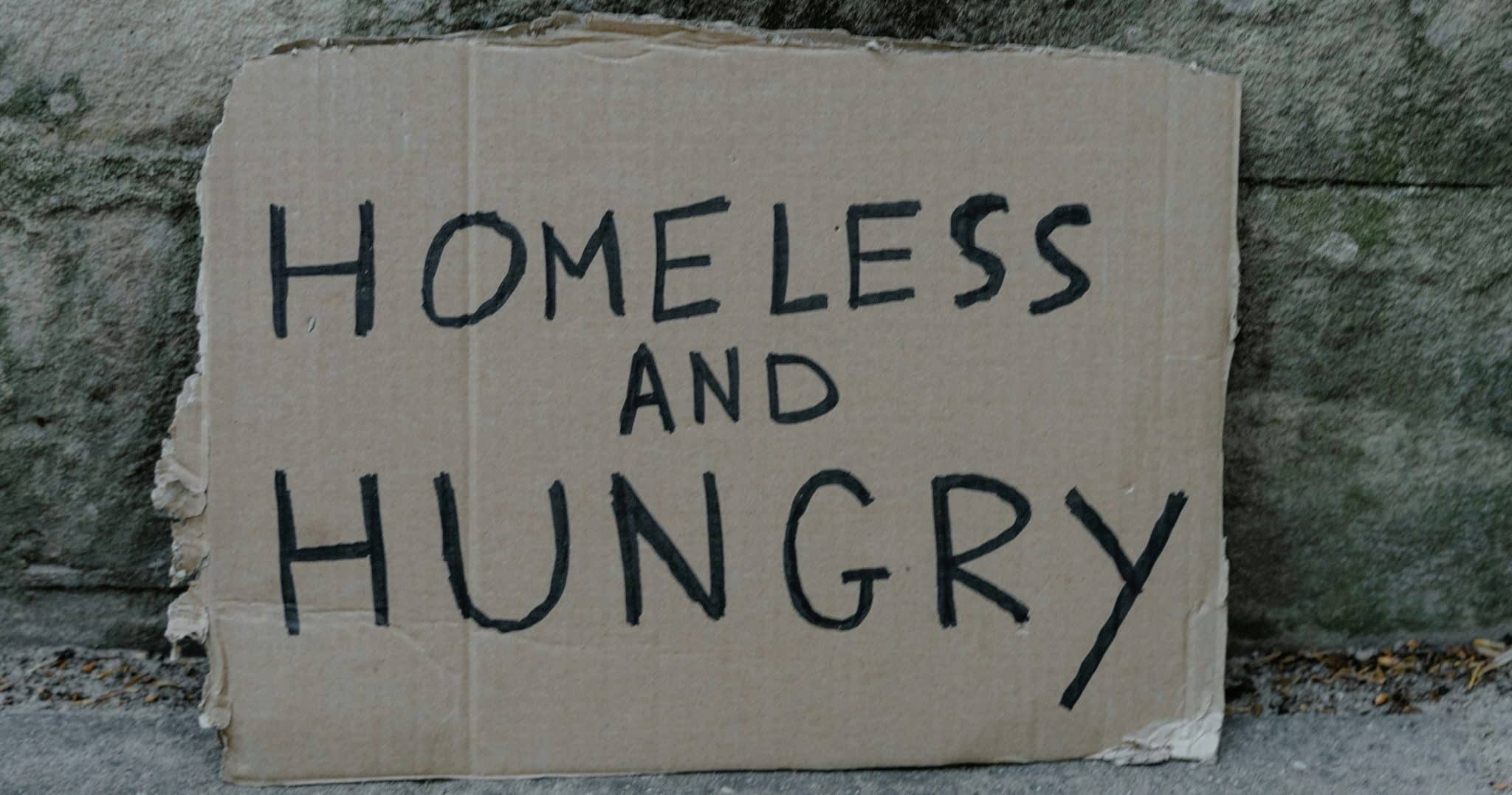
An unpleasant encounter with a bully at a hawker centre produced precious life lessons for Wai Jia, Cliff and their daughters. Photos courtesy of Tam Wai Jia.
“WANT TO GET HURT AH!”
He snarled at my children, aged five and three, as we stood behind him – too close, according to him – in queue at a hawker centre.
“Excuse me,” I said in an even tone. “If you have anything you’d like to say, please tell it to me, and not my children.”
“YOU! I TELLING YOU! YOU DON’T KNOW HOW TO TAKE CARE YOUR CHILDREN!”
My face burned. I took a deep breath. He walked away.
“It’s okay, children – we don’t have to react to everything.”
I thought about what it meant to model self-control. I made a choice.
I walked back, hot soup in hand. I shared what happened with my husband, Cliff, our all-time harmony man.
I watched in fear and awe as Cliff got out of his seat.
“He was being disrespectful to you. I’m going over.”
“No no, I’m fine.” But he was gone.
“Pray, Mama,” my five-year-old said. “Got to pray for Papa.”
This was a first for Cliff.
My heart raced.
“Pray, Mama,” my five-year-old said. “Got to pray for Papa.”
“Oh yes, we do,” I whispered. I watched, feet locked, fearing fists might fly.
A brisk exchange of words. Then, to my relief, Cliff walked back.
“What happened?”
“I asked him what he said to my kids. And to you. He said ‘NOTHING!’ I told him that you know how to be a good mother, and it’s not his place to tell you how to be one.”
My tears welled up.
For the first time, I understood the paradox of turning the other cheek. While I had chosen not to return evil for evil, my husband had risen to his role as protector to defend me. What he’d displayed was not tit-for-tat, but a courageous standing up for his wife and children.
“I will never forget this moment,” I said, holding back tears.
Are we meant to be doormats?
The next day, I shared the incident on my Instagram account, adding: “I thank God for the men in our lives who understand that their role and power is not to lead by oppression and disdain, but by chivalry and courage.”
“I am not a hero. But over the years, I learnt courage.”
In his own Facebook reflection, Cliff wrote: “I am not advocating we go and confront everyone about everything. For me, this issue was about defending my wife and my family. I am the shepherd to them and, as such, I will defend them.
“I did not start this way. For years, I struggled with being passive. It is easier not to react and hide behind ‘being meek’. I am not a hero. But over the years, I learnt courage. It’s as simple as that.”
Neither Cliff nor I expected the swift response from nearly a thousand people, who sent in questions and comments. Many asked further.
“So, when can I stand up for myself?”
“Are there any scenarios we can stand up for ourselves or are we meant to be doormats?”
“What if I have a passive husband or father?”
When confronted with bullies
Here’s how Cliff and I summarised our approach to bullies:
#1 Confront the wrongdoing
As Christians, we might mistake what it means to “turn the other cheek” for being a doormat.
As salt and light in our homes, workplaces and at church, we must be brave to stand up to evil and call it out.
But no, the Bible does not tell us to ignore wrongdoing. In fact, Psalm 82:3 tells us to “Defend the weak and the fatherless; uphold the cause of the poor and the oppressed.”
Matthew 18:15 says: “If your brother sins against you, go and tell him his fault, between you and him alone. If he listens to you, you have gained your brother. But if he does not listen, take one or two others along with you, that every word may be confirmed by the evidence of two or three witnesses.”
Clearly, God wants us to step up bravely to confront wrongdoing, and not permit sin to continue.
As salt and light in our homes, workplaces and at church, we must be brave to stand up to evil and call it out.
#2 Examine your heart
However, the state of our hearts as we confront wrongdoing is crucial if we are to make the right choices.
“If I choose ‘peace’ by avoidance, is that really peace? It is not peacekeeping. It is acting out of fear and avoidance.”
As soon as Cliff returned to our table, I watched my children’s faces as they tried to understand and process all that had happened. Simplistically, I summarised the lessons gleaned into three points.
“Children, I said, Mama wants to teach you three things. One, remember the song from Romans 12:21? Do not be overcome by evil, but overcome evil with good. Two, if you meet a bully yourself, stay clear. Move aside. Three, if you see someone else bullied, stand up to the bully.”
They nodded. “Yes, Mama,” my older five-year old chirped. “I know.”
Simply put, if you’re acting out of anger or vengeance, hold back. If you’re not acting out of fear or cowardice, step forward with courage. And if you’re acting out of self-righteousness, ask God for wisdom and discernment on how to act rightly without coming across as prideful.
Cliff emphasised: “It is very common for Asian men to choose passivity. But if I choose ‘peace’ by avoidance, is that really peace? It is not peacekeeping. It is acting out of fear and avoidance. We must be intentional in examining our heart’s motive.”
#3 Leave room for God’s justice
Romans 12:29 reminds us to “leave room for God’s wrath.” What does this look like?

“I am not advocating we go and confront everyone about everything,” reflects Cliff. “For me, this issue was about defending my wife and my family. I am the shepherd to them and, as such, I will defend them.”
This means that when we have confronted the wrong, examined our hearts and taken action, we are intentional about leaving room for God to act on our behalf.
My decision to hold back and leave room for God’s justice, opened the way for my husband and God to act on my behalf.
When the older man shouted at me, I was triggered because it wasn’t the first time an older man had said I should be a “better mother” in public. I wanted to retaliate and have the last word.
Yet, I was reminded that winning this fight would not do any good. I decided to let the matter rest. The interesting part is that, had I taken things into my own hands, it would have left no room for Cliff to act. My decision to hold back and leave room for God’s justice, opened the way for my husband and God to act on my behalf, with a far more powerful outcome.
Psalm 37:7 encourages us to wait on God before taking vengeance into our own hands.
“Be still before the Lord
and wait patiently for him;
do not fret when people succeed in their ways,
when they carry out their wicked schemes.”
#4 Recognise that your war is not against flesh and blood, but a spiritual one
Lastly, we must realise that beyond what we see are spiritual forces of darkness at work.
The war shifted, not because I had striven more, but because we yielded to God in the spirit.
While we were in the mission field in Uganda, there was a difficult incident where we were continually taken advantage of. I was at my wit’s end trying to seek justice and compensation for myself.
But Proverbs 25:21 says: “If your enemy is hungry, give him food to eat; if he is thirsty, give him water to drink.”
It was only when God spoke to me to let go, and to present a Christmas gift to those who had wronged us that the situation took a drastic twist. We ended up being compensated far more than we had expected.
The war shifted, not because I had striven more, but because we yielded to God in the spirit.
To wives struggling with passive husbands
1. Pray
Egging your husband on to becoming more proactive is not the way to go. While it sounds counterintuitive to do nothing, he will only feel more resentful and resigned if badgered by his wife to take the lead.
2. Step back
Becoming more proactive to compensate for his passivity will only reinforce unhealthy patterns.
Sometimes, you might just have to acknowledge his headship, let consequences happen and allow him to take in the fullness of his inaction. It can be painful and take a lot of patience.
But it is an exercise of intention to stop overstepping your boundaries to allow your husband to claim ownership for his role in your marriage.
Sometimes, you might just have to acknowledge his headship.
We recommended the book, Wild at Heart, by John Eldredge, which shares how resignation and passivity really is the result of the Fall, when Adam failed to own up to his responsibility when Eve partook of the forbidden fruit.
The result of the fall was that the woman’s desire would be for her husband, but he would rule over her. (Genesis 3:16)
Here, this verse exemplifies a common struggle we see in marriages today – a passive husband, and an over-controlling wife.
It took me many years to get Cliff to read the book. But I didn’t badger him. I just kept praying.
Years later, on an overseas retreat, he asked me to recommend a book, gladly took this and devoured it. It was life-changing for us both. So, never underestimate the power of prayer, even if it takes years.
To the daughters of passive fathers
1. Accept your limitations
You cannot change your parents. Yet, understanding the Fall as we described and the impact of generational baggage can give you newfound compassion for the passive-dad-aggressive-mum form of child rearing you grew up with.
2. Ask yourself: How can you break this for your own family in future?
3. Change the atmosphere in small ways
Find ways to honour your dad, in times when he might feel overridden or written off.
When facing unjust situations
1. Confront the wrong bravely
Being meek doesn’t mean we turn a blind eye to wrongdoing.
2. Examine your heart
Are you confronting the situation/situation from a position of self-righteousness, vengeance or pride?
3. Leave room for God’s justice
Are you placing faith in God (and even your husband, where applicable) to correct wrongdoing, or are you bent on taking things into your own hands?
4. Recognise your war is a spiritual one
Recognising that your war is not just with flesh and blood, but a spiritual one, transforms your combat mode to prayer.
The bottom line is: If we have gone through the above four steps, we can trust God and make room for Him (and our husbands) to take care of the rest.
RELATED STORIES:
New course launched to help churches build disability-inclusive communities
We are an independent, non-profit organisation that relies on the generosity of our readers, such as yourself, to continue serving the kingdom. Every dollar donated goes directly back into our editorial coverage.
Would you consider partnering with us in our kingdom work by supporting us financially, either as a one-off donation, or a recurring pledge?
Support Salt&Light




